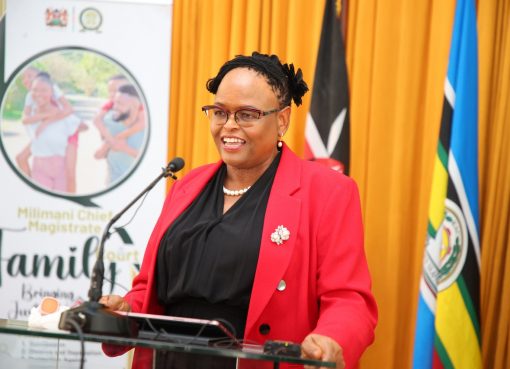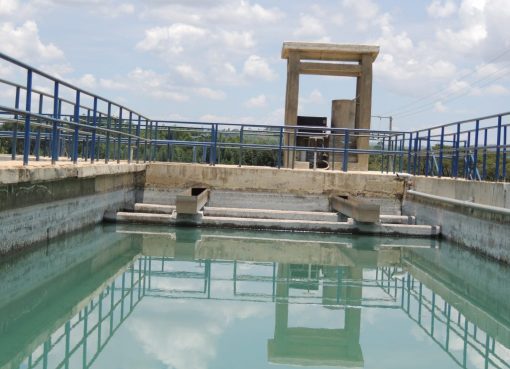It is midday at Mkuki area in the wild bushes of Mwatate gemstone mining fields in Taita-Taveta County. The overhead sun is scorching hot. The heat has forced a dozen bare-chested miners to seek shade under a thorny tree nearby. They will resume digging later after the heat decreases.
But not all miners are resting. 35 metres below the earth surface, Mzee Senja Changanya slowly manoeuvers through a huge horizontal tunnel christened Neema. Following closely behind him is a young female mining apprentice, Catherine Wakesho. A powerful beam from a battery-powered torch strapped around Mzee Changanya’s head cuts through the thick darkness, ahead lighting up a winding tunnel.
There is nothing much to see. Just roughly-hewn rocky walls snaking away into the subterranean darkness.
“It’s a different world down here. It’s always dark and you can never tell when day ends and night comes,” Changanya observes in a raspy voice as he prepares to start the perilous climb to the surface.
To any ordinary person, the climb is a spine-chilling experience; an old man scaling the near-vertical walls without climbing gear. But Mzee Changanya has been going up and down such tunnels for decades. His calloused hands and feet instinctively find ledges on the walls as he pulls himself up with grace and energy that defies his age. The veteran gemstone miner is an expert climber. He only pauses to check the progress of the female apprentice climbing after him.
Five minutes later, the old man and the young girl emerge at the surface; sweaty, dusty but unscathed. Hunting for gemstones deep in the bowels of the earth is a daily ritual for the old man who is considered the most experienced miner in Chawia mining fields.
Mzee Changanya is also an official with Chawia Minerals Community Based Organization (CBO) where he acts as the group’s head of mineral section. Despite his age, the old miner is a legend of sorts in mining circles. His prowess and paranormal ability to locate rock green-garnets and other precious stones in rocky cliffs have earned him the rare nickname of ‘Daktari wa Miamba’ as deference to his vast knowledge on minerals.
Mzee Changanya’s encyclopedic knowledge on forms of gemstones found in the region came from decades of toiling as a small-scale miner in the mining fields. He has over 47 years’ experience having started mining in 1972. Overtime, he has established a solid reputation as a veteran miner and often has young miners attached to him for lessons on gemstones.
A most extraordinary aspect of the Changanya’s life as a miner is that he has never stepped inside any class. The old man never shies away from declaring to all who care to listen that he never had the privilege of going to any school. He says all his knowledge comes from practical experience of working in the tunnels where mining takes place.
He adds that gemstone mining is a practical field that demanded one to be physically present in the mines.
“I have never attended any school but I know all there is to know about gemstones,” he says in a matter-of-fact tone that has no conceit in it.
The old man’s vast experience in mining has been so impressive that it caught the attention of mining scholars at Taita-Taveta University. The University has started a partnership with the CBO where students in mining department are sent to the mines under the tutorage of Mzee Changanya for a three-month mandatory attachment.
The University is the only premier mining institution of higher learning in Kenya. Plans are underway to transform the institution into a regional mining University.
The veteran miner takes the students through intensive hands-on practical works that includes mineral identification and classification, mine safety, rock-types and quality evaluation amongst others. At the end of the attachment period, he evaluates a student’s output and writes a recommendation based on individual learner’s strengths. So far, 12 mining graduates have been sent to him by the varsity for training.
“They must come and experience mining in its practical sense. It’s a hard life as it involves sometimes spending the night here and waking up early to go digging into the tunnels. At the end, they learn a lot about gemstones,” he explained.
He adds that the CBO which was started in 2014 has become a lifeline for hundreds of unemployed young men and women. The group was formed after several small-scale mining groups merged to form a bigger one with legitimate officials which allowed them to have better negotiating powers with mining stakeholders and government.
He reveals that the proceeds from mining had enabled several miners to improve their lives and engage in community-empowerment programmes. He estimates the mines have yielded gemstones worth over Sh. 20 million.
“We have built houses, taken children to school and even sponsored learners from very poor backgrounds,” he said. Using his own money, Mzee Changanya has also built a small mosque for Muslim miners at the CBO ground.
He however said mining in the region was fraught with challenges including lack of equipment, safety gear and dynamites to blast rocks. The miners employ manual operations which are exhausting and slow. He also said it was difficult to get grants from government to engage in small-scale mining.
“We need more empowerment to help us mine better. This sector can employ thousands of young people who are jobless,” he said.
Ms. Catherine Wakesho, one of the two female miners at Chawia CBO, said she was learning a lot from the veteran miner on types and nature of minerals. Ms. Wakesho, a mother of one, said she left her child under the care of her mother and came to the mines and try her luck instead of staying at home.
“I could not stay and wait for anyone to provide for me. I can work here because I want to educate my child,” she said.
She further reveals that male miners did not bother and instead had respect for a woman who toiled in the mines like they did. She also said there is an unwritten code against making sexual advances towards female miners.
“We are one family hunting for gemstones. That is what has brought us all here,” she said.
By Wagema Mwangi




